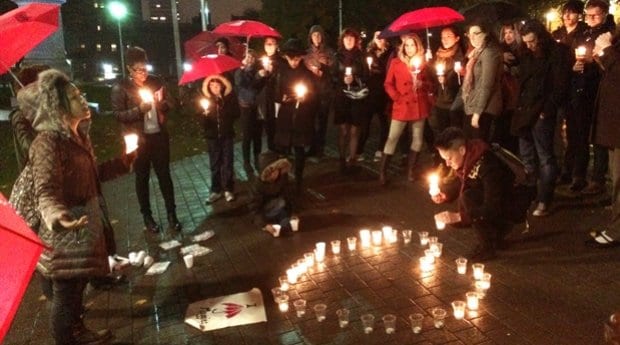Sex workers and their supporters held a candlelight vigil at Queen’s Park in Toronto on Nov 6 to mark the passing of Bill C-36, which recriminalizes sex work and which they say will put more sex workers in danger.
C-36, the so-called Protection of Communities and Exploited Persons Act, passed the Senate on Nov 4 and has received royal assent. The bill was introduced by the Conservative government in response to a Supreme Court ruling last December that struck down the provisions of the Criminal Code relating to sex work, which sex workers had said put their lives in danger by forcing them to work underground and without support in order to avoid prosecution.
The new bill aims to get around the Supreme Court ruling by criminalizing clients of sex workers rather than the workers themselves, which critics say still forces workers into unsafe conditions in order to meet clients. Additionally, the bill for the first time criminalizes anyone who places an ad for a sex worker, including anyone involved in a newspaper that places such ads.
Valerie Scott, one of the women who led the court challenge against the old sex-work laws, says that the fight will continue.
“It’s clear that they don’t take the Supreme Court of Canada ruling seriously. This law is a complete rewrite of the old laws except it’s a bit worse,” Scott says. “It’s a slap in the face of every sex worker. We’re a huge community, and most of our clients are good guys.”
Scott says the law will “absolutely” be challenged in court again, but it will take time to rebuild a new case against it.
“Do you go to court without an evidentiary record? That’s not wise in my opinion. What we have to do is begin to amass evidence of rapes, robberies, beatings and murders, and when the body count gets high enough to satisfy the courts and Harper government, we’ll go back to court,” she says.
Speakers at the vigil agreed that the new law would not deter sex workers from continuing their trade and that it would only push the work further underground.
“I’m pretty sure that we’ll navigate the system in some way,” says Monica Forrester, of Maggie’s Toronto. “We still have to push the local government and communities to make them realize that sex work is real work.”
Maggie’s co-chair Akio Maroon was more blunt. “This bill will be the reason why sex workers will be harmed and killed. I’ve seen the devastation that criminalization has already caused. We’ve lost friends, loved ones, lovers and family members due to criminalization of sex work. Folks you see here today you will not see here next year.”
Maroon says that although the law has been framed as a necessary effort to protect female sex workers, it also affects male sex workers serving gay and straight clients.
“The law impacts sex workers the same way across the board. The discussion has been more focused on women sex workers because the Conservative government has seen women as these fragile creatures that need to be rescued from this consensual work that they have chosen. In order to paint that picture, they’ve painted it with women because in a patriarchal society, it would be harder to paint these men as poor abused non-consensual partners.”
One avenue that Maggie’s will investigate will involve asking the province to work around the new law. In Canada, administration of justice is a provincial responsibility, and provincial attorneys-general have some limited discretion in the prosecutions that they advance. However, police officers and judges are independent of political influence and are sworn to uphold the law as written.
“We will petition the premier [Kathleen Wynne], who the legal framework looks to to govern Ontario. She’s seen LGBT rights and people getting out of the bedrooms of Canadians, and I feel that she is empathetic to our cause,” Maroon says.
The law will likely also face immediate Charter challenges from newspapers over the new prohibitions on advertising sex work. The law prohibits knowingly advertising sex work with a penalty of up to five years. Many alternative newspapers earn a big chunk of revenue from placing ads for sex workers.
“We are 100 percent with the sex workers of Toronto on the subject of C-36,” says Alice Klein, editor and CEO of Now magazine, who was at the vigil. “We are committed to fighting the outrageous infringement of human rights. We have run adult ads because we could never censor sex advertising and run beer advertising and car advertising. We’re working hard on building a coalition to fight this law.”


 Why you can trust Xtra
Why you can trust Xtra


